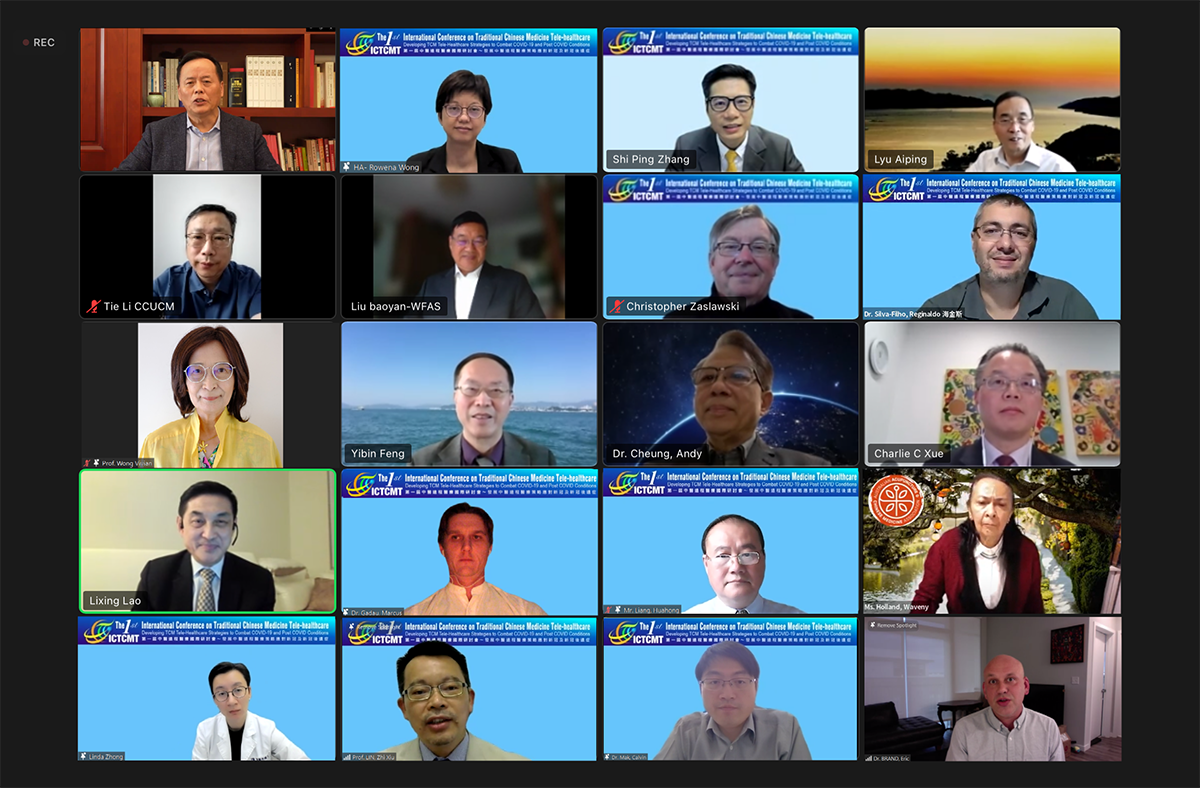News
SCM in collaboration with WFAS organises international conference to explore TCM telemedicine strategies for combating COVID-19
31 August 2022
Telemedicine has been around for decades but it was not until the COVID-19 pandemic that it began to gain popularity among Chinese medicine practitioners and their patients. As one of the first local health care providers to launch online consultation services during the pandemic, the School of Chinese medicine (SCM) at Hong Kong Baptist University (HKBU) joined hands with the World Federation of Acupuncture-Moxibustion Societies (WFAS) to host The 1st International Conference on Traditional Chinese Medicine Tele-healthcare (ICTCMT) on 26-27 August.
The online event brought together a total of 50 scholars, industry leaders and practitioners from 10 countries to speak on topics such as the treatment of COVID-19 symptoms and post-COVID syndromes, the use of big data and evidence-based practice, quality control and supply chain of herbal products, application of information technology in tele-healthcare, regulatory framework for telemedicine, as well as ethical concerns relating to the practice of telemedicine in Hong Kong and overseas.
Addressing an audience of over 5,000 people at the opening ceremony, Professor Lyu Aiping, Dean of Chinese medicine at HKBU, recalled a series of tele-healthcare initiatives launched by the University earlier this year to circumvent the challenges presented by the fifth wave of the pandemic. Apart from rolling out the "Free Online Consultation Service for COVID-19 Patients" which has benefitted over 41,000 people, the University established the "HKBU Chinese Medicine Telemedicine Centre Against COVID-19" to provide a one-stop medical service to the public, and teamed up with the Hospital Authority and Hong Kong Association of Gerontology under a special scheme to offer remote consultation and medicine delivery services to residents and staff members of elderly homes.
Professor Liu Baoyan, President of WFAS, said in his opening remarks: "As a national treasure, Chinese medicine has been introduced to 196 countries and regions. The rapid advancement of wireless communication technology in the 5G era has opened up even more opportunities for Chinese medicine. As telemedicine takes centre stage during the COVID-19 pandemic, Chinese medicine has been able to reach more people in a cost-effective and efficient manner."
Ms. Rowena Wong, Chief Manager of the Chinese Medicine Department of the Hospital Authority, showed her support to ICTCMT by delivering a keynote speech titled "Traditional Practice in a New Era – Pioneering Chinese Medicine Telecare to Combat COVID-19 Pandemic in Hong Kong", which tells a great story of how Chinese medicine came into use in telecare in Hong Kong.
Dr. Zhang Shi-ping, Chair of the Organising Committee of ICTCMT and Associate Professor of SCM, took the opportunity of the occasion to introduce the smartphone tongue imaging method developed by his team to enable more accurate telediagnosis. He encouraged participants to make use of the conference proceedings on the event website (http://tastcmi.org/1stICTCMT/) as a useful guide for the practice of TCM telemedicine.


The officiating party of the opening ceremony consists of Professor Lyu Aiping, Dean of Chinese Medicine of HKBU; Professor Liu Baoyan, President of WFAS; Professor Charlie Xue, Associate Vice-Chancellor (International) of RMIT University, Australia; Professor Lao Lixing, President of Virginia University of Integrative Medicine, USA; and Dr. Zhang Shi-ping, Chair of the Organising Committee of ICTCMT and Associate Professor of SCM.